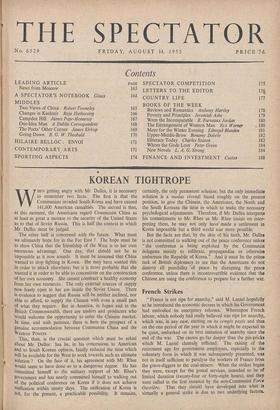S
KOREAN TIGHTROPE
WHEN getting angry with Mr. Dulles, it is necessary to remember two facts. The first is that the Communists invaded South Korea and have caused 141,000 American casualties. The second is that, at this moment, the Americans regard Communist China as at least as great a menace to the security of the United States as to that of Soviet Russia. This is half the context in which Mr. Dulles must be judged.
The other half is concerned with the future. What must we ultimately hope for in the Far East ? The hope must be to show China that the friendship of the West is to her own enormous advantage. One day, that should not be as impossible as it now sounds. It must be assumed that China wanted to stop fighting in Korea. She may have wanted this, in order to attack elsewhere; but it 'is more probable that she wanted it in order to be able to concentrate on the construction of her own economy. She cannot construct a healthy economy from her own resources. The only external sources of supply now freely open to her are inside the Soviet Union. There is evidence to suggest that Russia will be neither inclined, nor able to afford, to supply the Chinese with even a small part of what they require. But in America, in Japan and in the British Commonwealth, there are traders and producers who would welcome the opportunity to enter the Chinese market. In time, and with patience, there is here the prospect of a genuine accommodation between Communist China and the Western Powers. • This, then, is the crucial question which must be asked about Mr. Dulles : has he, in his concessions to American and to South Korean opinion, fatally reduced the time which will be available for the West to work towards such an ultimate solution ? On the face of it, his agreement with Mr. Rhee Would seem to have done .so to a dangerous degree. He has Committed himself to the military support of Mr. Rhee's government and has nearly committed himself to walking out of the political conference on Korea if it does not achieve unification within ninety days. The unification of Korea is not, for the present, a practicable possibility. It remains, certainly, the only permanent solution; but the only immediate solution is a modus vivendi based roughly on the present position, to give the Chinese, the Americans, the North and the South Koreans the time in which to make the necessary psychological adjustments. Therefore, if Mr. Dulles interprets his commitments to Mr. Rhee as Mr. Rhee insists on inter- preting them, he may not only have" made a settlement in Korea impossible but a third world war more possible.
But the facts are that, by the skin of his teeth, Mr. Dulles is not committed to walking out of the peace conference' unless " the conference is being exploited by the Communist delegates mainly to infiltrate, propagandise or otherwise embarrass the Republic of Korea." And it must be the prime task of British diplomacy to see that the Americans do not destroy all possibility 'of peace by disrupting the peace conference, unless there is incontrovertible evidence that the Chinese are using the conference to prepare for a further war.


































 Previous page
Previous page